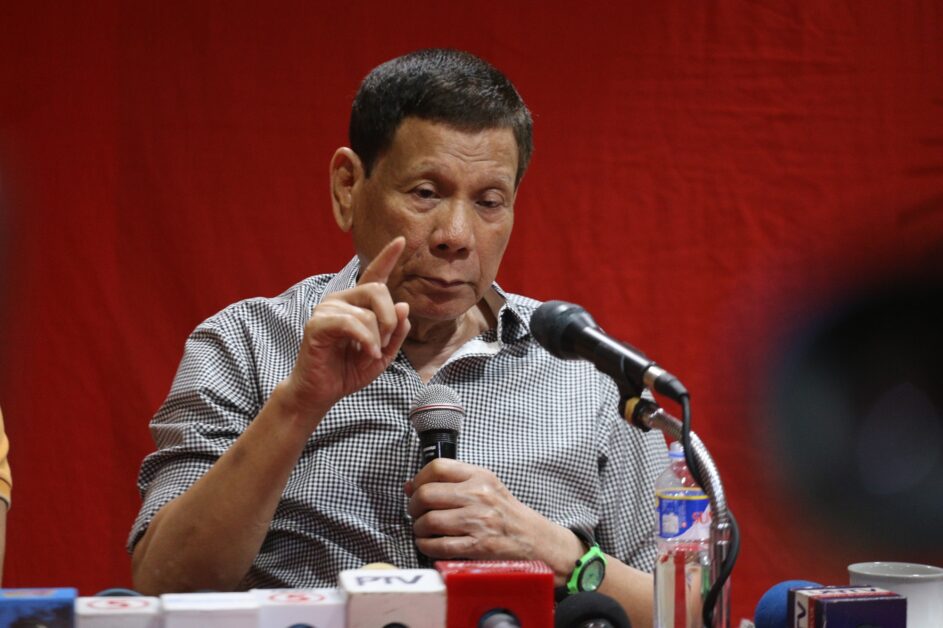
DAVAO CITY (MindaNews / 19 October) – Former President Rodrigo Duterte has said he would appear if invited by the House of Representatives Quad-Committee (Quad Comm) investigating the extrajudicial killings during his administration’s “war on drugs.”
He made the pronouncement in an interview with SMNI News Thursday afternoon, where he also belied the allegations of retired Colonel Royina Garma, former general manager of the Philippine Charity Sweepstakes Office, who claimed that Duterte replicated the “Davao model” in the nationwide campaign against illegal drugs during his presidency.
Duterte said he would be happy if the quad-committee will invite him to the succeeding hearings, if they would want specific answers, or if they “might want me to clarify, answer or explain or whatever. I’m ready for that.”
Duterte said that rather than investigating his former subordinates, the Quad Comm should consider inviting him directly.
“Ako na mismo ang tawagin nila at ibibigay ko sa kanila ang sagot na gusto nila. Ang gusto nila, hindi ang ko gusto. As a matter of fact, magtatanong ako sa kanila before the start of any official proceedings, sasabihan ko sila anong gusto ninyo na marinig sa bunganga ko. Ganoon. Ibibigay ko sa kanila. Bahala sila kung ano gusto nilang itanong,” Duterte said.
(They should call me in the hearing and I’ll give them the answers they want. What they want, not what I want. As a matter of fact, before the start of any official proceedings, I will ask them what they want to hear from my mouth. I’ll give it to them. It’s up to them what they want to ask.)
Responding to Garma’s allegation, Duterte said police officers “would only receive food, drinks and greetings” as rewards after their successful mission against illegal drugs.
“Ang pinakaano [ng mga pulis] sa akin is ‘pag mission accomplished, yayain ko sila sa restaurant, magkain kami and I congratulate them. Saka palainom ang pulis. Bigyan mo ng dalawang boteng scotch (The most [that I did for the police] when they accomplished their mission is I invite them to a restaurant, we eat, and I congratulate them. The police like to drink and I usually give them two bottles of scotch),” Duterte said.
“Hindi ‘yan tatanggap ng pera. Nahihiya ‘yan (They won’t accept money. They would be ashamed),” he added.
But Garma, as well as police Lieutenant Colonel Jovie Espenido, who played a major role in the implementation of Duterte’s “war on drugs,” testified before the Quad Comm that Duterte allegedly provided cash rewards for successful police operations against illegal drugs.
Garma said Duterte earlier in his presidency told her to find who is capable of implementing the “war on drugs” on a national scale, replicating the “Davao model.”
She alleged that only killings would earn payments with the reward ranging from P20,000 to P1 million, but added she is not familiar how it worked.
“The Davao model involves three levels of payments or rewards. First is the reward if the suspect is killed. Second is the funding of planned operations (COPLANS). Third is the refund of operational expenses,” Garma said in her affidavit.
But Duterte belied her claims.
“Walang pulis na papasok sa ganoon. Walang gag*ng pulis na papasok. Makukulong sila (No police officer would get involved in that system. No police officer is foolish to get involved. They would end up in jail). Why would they accept that kind of agreement when it will later on bring their downfall?” Duterte said.
Duterte said the police “would only agree to accept additional funds to their operations, as requested.”
“Yan siguro ang sinasabi nilang reward (Maybe that’s the reward they are talking about),” he stressed.
Duterte served as president of the country from June 30, 2016 to June 30, 2022.
Official records placed the “drug war” deaths during the Duterte administration at around 6,000. But human rights groups said the death toll may be as high as 30,000.
The Philippines is facing an investigation by the International Criminal Court (ICC) for crimes against humanity that might have been committed during Duterte’s “war on drugs.”
President Ferdinand Marcos Jr. had said an ICC investigation into the bloody war against illegal drugs “would violate the country’s sovereignty.”
The Philippines, on Duterte’s order, withdrew from the Rome Statute, the treaty that created the ICC, in 2018. The withdrawal became effective starting in 2019.
However, the Rome Statute provides that a State may still be investigated for crimes covered by the agreement that were committed before its withdrawal took effect.
For its part, Human Rights Watch called on the Marcos administration to initiate sweeping reforms in law enforcement in response to Garma and other witnesses’ testimonies on police corruption and abuse in the “war on drugs.”
“Recent testimony in Congress brought to light the murderous police infrastructure during Duterte’s ‘war on drugs,’” said Bryony Lau, deputy Asia director at Human Rights Watch. “President Marcos should take immediate steps for meaningful reforms to the Philippine National Police and other police agencies.”
She also called on the Departments of Justice and the Interior and Local Government to follow-up on the congressional revelations and credibly investigate “these ghastly crimes.”
“Concerned foreign governments and donors should press the Philippine government to respond promptly to ensure that state institutions are not misused to perpetrate such horrifying abuses ever again,” Lau said. (Ian Carl Espinosa / MindaNews)
0 Comments